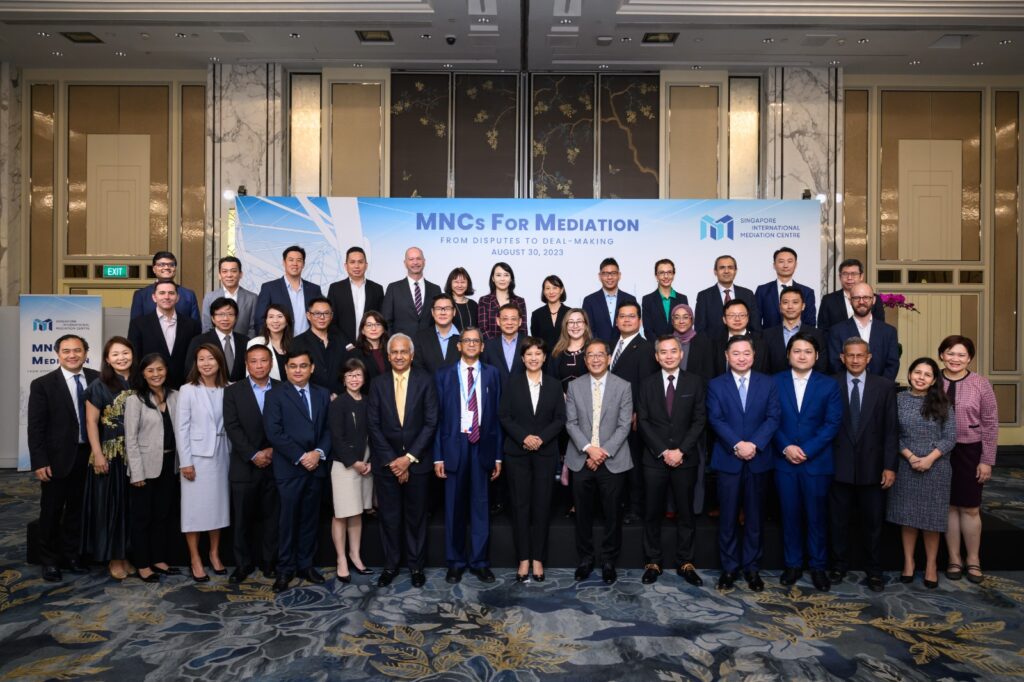
In the strongest show of corporate support in Asia yet for international mediation, 38 MNCs from a wide range of sectors including alternative investment, banking and finance, energy, fast-moving consumer goods (FMCG), information communications and technology (ICT), infrastructure, logistics, manufacturing, mobility, pharmaceuticals, professional services and real estate pledged their support for mediation as a way to resolve cross-border disputes speedily and cost-effectively. Together, they represent brands from nearly a dozen countries including China, Finland, Germany, India, Japan, the Philippines, Singapore, South Korea, Switzerland, United Kingdom and United States.
Four business associations – the Association of Corporate Counsel Singapore Chapter, IPREX, Singapore Business Federation and Singapore Corporate Counsel Association – also pledged to encourage their members to consider mediation when faced with a commercial dispute.
Before Ms Indranee Rajah SC, Minister in the Singapore Prime Minister’s Office and Second Minister for Finance and National Development as witness, they signed declarations of intent to support mediation at a luncheon ceremony at the Shangri-La Singapore on 30 August 2023 organised by the Singapore International Mediation Centre (SIMC).
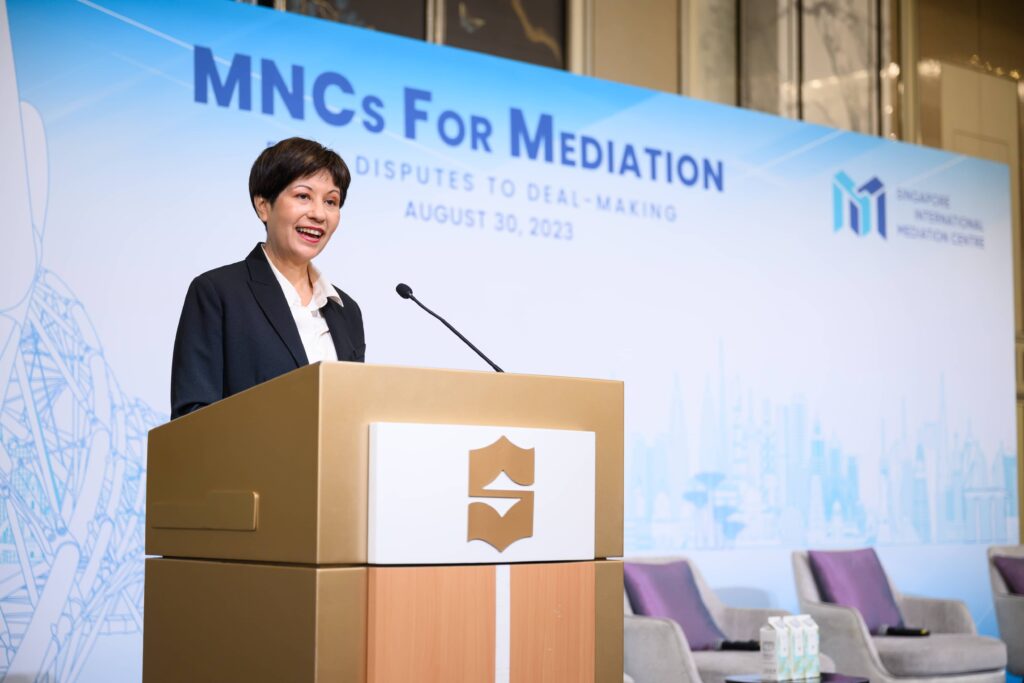
“To reap the benefits of mediation, we need more people to be familiar with it and use it. Therefore, please spread the word, to those in your organisations; to fellow industry players, partners and suppliers; and to your governments, in case they have not signed the [Singapore Convention on Mediation],” Ms Indranee urged the 240 guests in the room.
Ms Indranee said that the Singapore Government would continue to develop the mediation sector and encourage other countries to sign and ratify the Singapore Convention.
“There is no downside to signing and ratifying the Convention. It merely provides parties with another option when considering the most appropriate mechanism to resolve their disputes. If for some reason it does not work out, the avenues of litigation and arbitration are still there, and can be pursued as mediation does not preclude them,” she added.
Participants also heard from a panel of speakers with diverse backgrounds on how disputes can be turned into deal-making opportunities by leveraging the flexibility of the mediation process with the help of a savvy mediator. The speakers discussed why businesses prefer to resolve their disputes as early as possible: to save themselves costs, adverse publicity, time and resources, opportunity costs and potentially preserve the working relationship for future business.
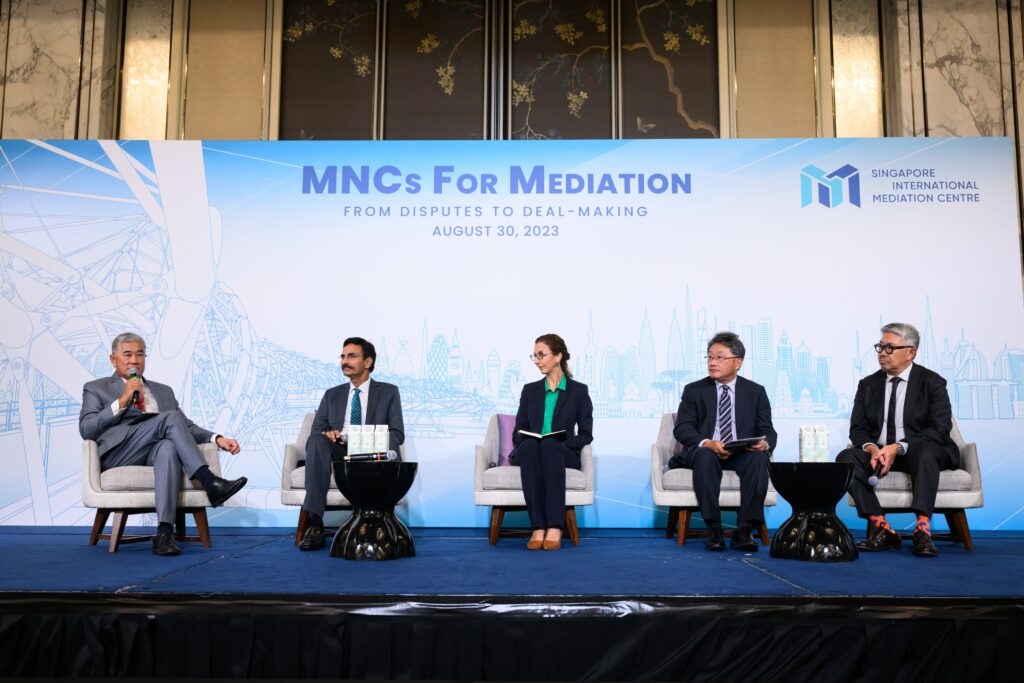
Participating companies on why they are supporting this initiative
“Mediation is a cost-effective, confidential settlement negotiation facilitated by a third-party neutral who is the mediator. This makes mediation a business-friendly option to resolve disputes, while offering the potential to look beyond the immediate contract to create new deals,” said Mr Mike Yeh, Regional VP and Director of Corporate, External and Legal Affairs, Asia at Microsoft.
“Mediation is also eco-friendly as hearings can be held online and the exchange of massive amounts of documentary evidence is discouraged. This saves time, electricity, paper and helps reduce the carbon footprint,” he highlighted.
Ms Loretta Yuen, Head of Group Legal and Compliance at OCBC said, “Banks like us are involved in many cross-border transactions, and we appreciate how effective mediation can be in resolving certain disputes. A successful mediation saves time and money, and helps parties avoid the emotional stress of a lengthy legal battle. We are proud to be part of this collective effort to encourage more businesses to consider mediation as an alternative dispute resolution mechanism to resolve cross-border disputes.”
Ms Kannan Malini, General Counsel of Surbana Jurong Group explained why mediation has its advantages in dispute resolution.
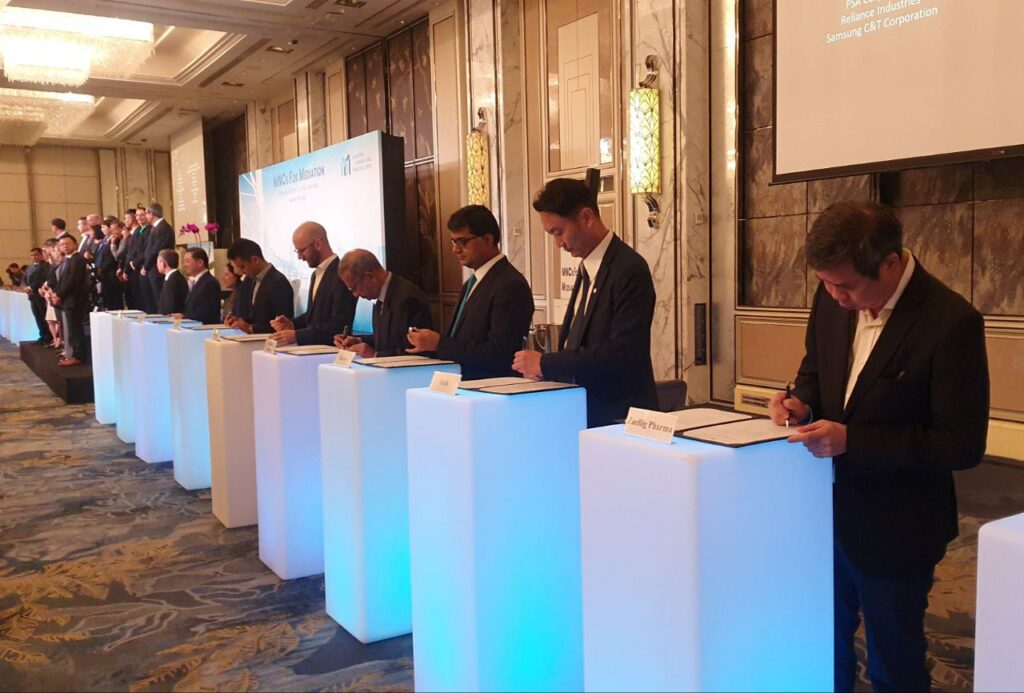
“The built-environment industry depends on various stakeholders in often competing commercial relationships to complete a development within time, cost and quality objectives. Mediation encourages teamwork and collaboration by reducing adversarial confrontation and encouraging constructive dispute resolution. This helps to achieve the overarching objective in the best interest of all stakeholders,” said Ms Kannan.
“More than 90 per cent of mediations, including complex commercial cases, at SIMC take a day. The rest may take two to three days to resolve. Seventy per cent of our cases achieve resolution. Mediation is a flexible process which can take place as a standalone hearing, or in collaboration with litigation or arbitration, either before or during litigation or arbitration. Such mediated settlements may result in a consent order of court or consent arbitral award respectively,” said Mr Chuan Wee Meng, CEO of SIMC.
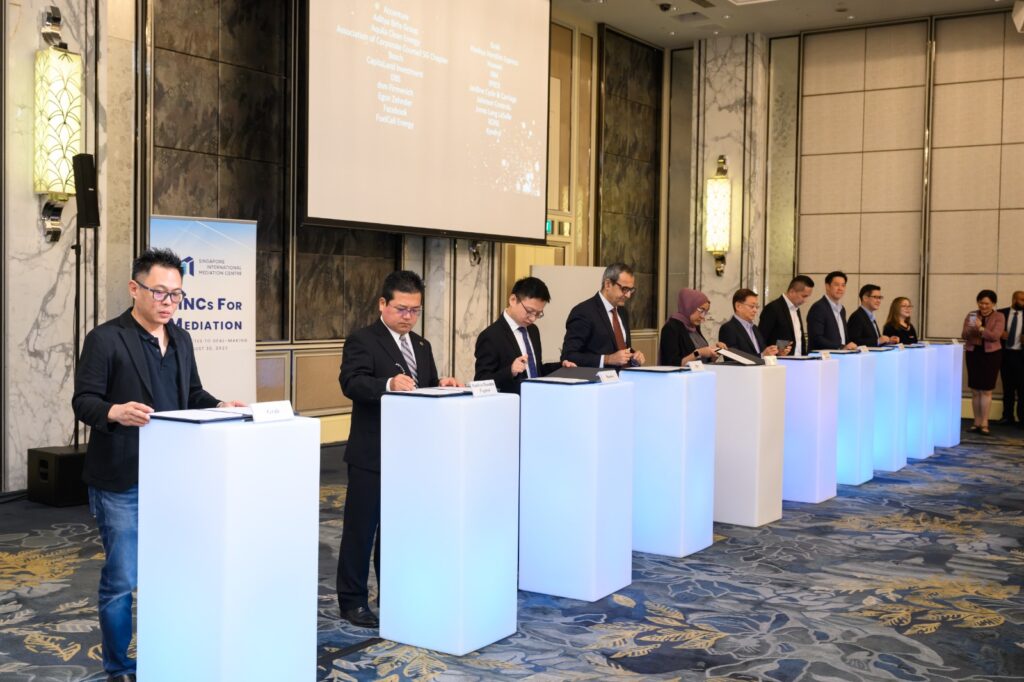
“We also have joint protocols and collaborations with dispute resolution institutions in countries such as China, India, Japan and Singapore for the benefit of companies with cross-border disputes,” added Mr Chuan.
For Dutch-Swiss MNC dsm-firmenich – the largest privately-owned fragrance and taste company in the world – having a choice of dispute resolution options is important.
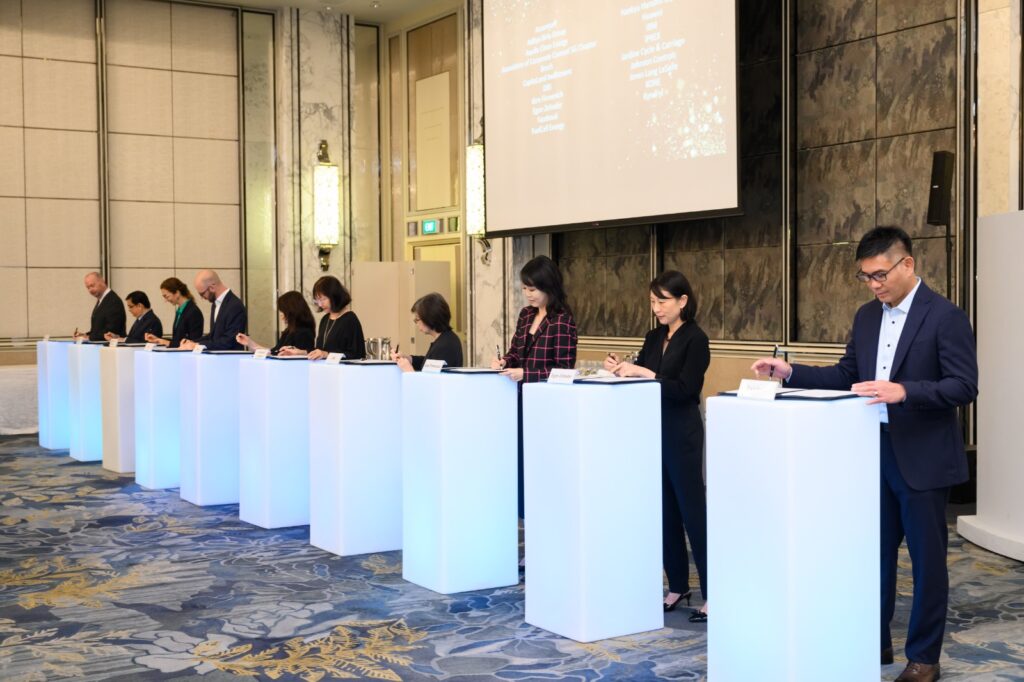
“Singapore, being a center of dispute resolution, offers a wide variety of dispute resolution platforms. Its continuous efforts in escalading the legal and judicial environment in the region is highly appreciated! We consider mediation a very useful tool to settle commercial related disputes because of its flexibility,” said Ms Doris Chen dsm-firmenich’s Head of Legal for APAC & India.
The corporate signing of this non-binding declaration took place during Singapore Convention Week, which is held each year to mark the 2019 inauguration of the Singapore Convention on Mediation.
Participating Organisations
ASSOCIATIONS
| Association of Corporate Counsel Singapore Chapter IPREX – A leading global communications and PR network with 1,100 professionals, spanning 100 markets worldwide | Singapore Business Federation Singapore Corporate Counsel Association |
COMPANIES
| Accenture Aditya Birla Group Aquila Clean Energy Bosch CapitaLand Investment DBS dsm-firmenich Egon Zehnder FuelCell Energy Grab Hankyu Hanshin Express Huawei IBM Jardine Cycle & Carriage Johnson Controls Jones Lang LaSalle KONE Kyndryl Lazada | LinkedIn Mahindra Group Marina Bay Sands Meta Microsoft Mitsubishi HC Capital Asia Nestlé Singapore OCBC PSA Corporation Reliance Industries Samsung C&T Corporation Siemens Sojitz Asia Spencer Stuart Splunk Surbana Jurong Group Tata Sons UOB Zuellig Pharma |
Ms Indranee Rajah SC, Minister in the Prime Minister’s Office and Second Minister for Finance & National Development on ways around common misconceptions about mediation
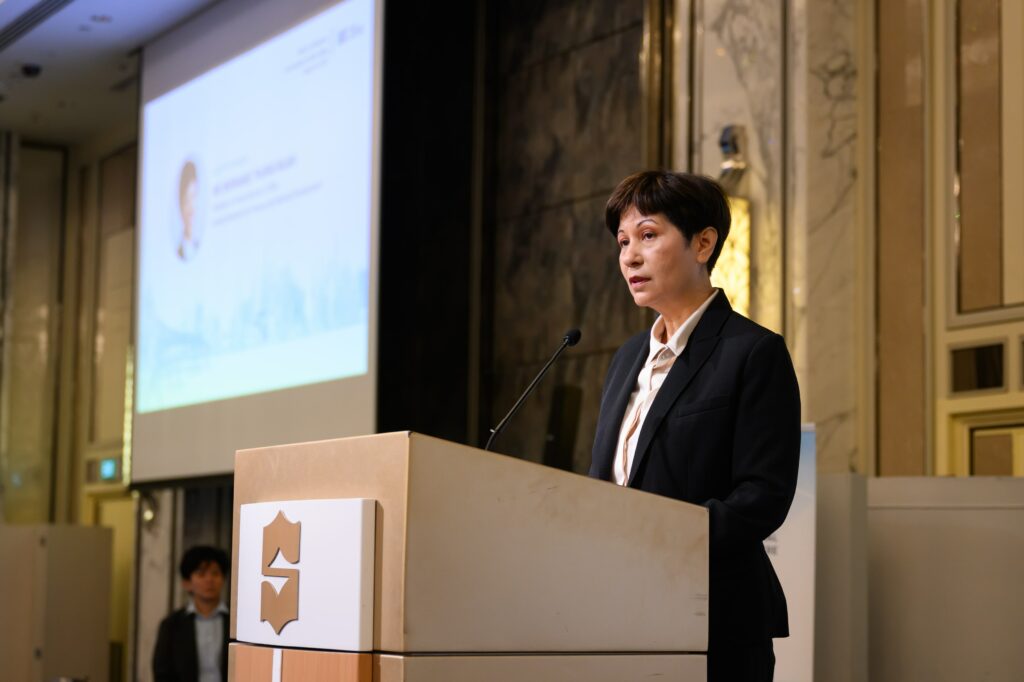
- Instead of appearing weak or overeager, proposing mediation indicates to the other party that you value the business relationship, and this encourages open dialogue. Mediation clauses could be included in the contract upfront so neither party needs to appear weak when the dispute is brought to a mediator.
- Since parties have control over the process, they similarly remain in control of what they choose to disclose during the mediation process. Instead of discussing certain issues during the joint session, parties can have private caucuses with the mediator, to discuss the options to reach a resolution, or consult their advisors in private.
- While coming to a settlement may entail some compromise, this needs to be considered in terms of what is gained in terms of time, costs and preservation of business relationships. Parties also often do not factor in what fighting it out really means in terms of stress, and what an individual has to undergo when subjected to cross-examination. It is usually just before you step into the cross-examination box, the witness box, that the parties really think about that. But by that time, it’s probably a little late. And just as parties can control what they choose to disclose during mediation, they can ensure that certain lines are not crossed in the settlement negotiations.
- The concern that the other party would not uphold the mediation settlement agreement can be addressed, because there are laws and protocols that uphold mediation outcomes. A key one is contained in the Singapore Convention on Mediation, which enables mediated settlement agreements to be enforced in the courts of countries which have signed and ratified the treaty. In Singapore, our Mediation Act, allows parties to apply to record their agreements as an order of court, if certain conditions are met. Once recorded as an order of court, it will be enforceable in the same way as a court order or a judgement.
